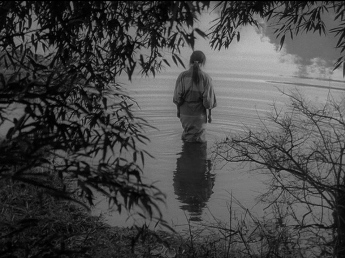There are certainly great things buried here. Boris Kaufman’s photography deserves special mention: he attempts a sort of Life Magazine version of neo-realism—gritty but not cock-eyed, superficially immediate but geometrically precise. Whatever coherence the film has emerges from Kaufman’s camerawork. It certainly doesn’t come from the directing and scripting. Kazan and Schulberg keep their eyes on the morals here; all the points are underlined, all the metaphors made explicit, telling business and expressive gestures strictly aberrational and never fully part of the larger atmosphere. In other words, reminiscent of the Ford of The Informer rather than the Ford of How Green Was My Valley. The mood is unrelentingly grim in a way that forsakes the possibility of the elegant digression; instead the elegance quota must be satisfied with the trite symbolism of pigeons flocking around Brando the stoolie. Brando's performance, as some have remarked, is pretty good, but that’s easy compared to narrative and psychological cipher that is Eva Marie Saint. Karl Malden’s performance as the priest is histrionic and pitched unevenly enough to begin with; it is seldom helped by Leonard Bernstein’s underscoring, which often aims to elevate this scraggly proletariat fairy tale to a soaring middle-brow outing to Lincoln Center.
The political theme is rather dubious. Perhaps best understood when clustered with other contemporaneous liberal-rightwing Hollywood movies such as The Sun Shines Bright and Bad Day at Black Rock, On the Waterfront infamously, if only implicitly, equates speaking surly truth to mob power with naming names for HUAC. But an ideological critique of On the Waterfront need not venture outside the film itself, which essentially presents the dockworkers as a gullible mass with such limited class consciousness that they actively sabotage their own interests (shades here, too, of Metropolis). Kazan presents the Hoboken underclass as an amalgamation of unthinking automatons, ready to toe the mob line and spit upon their martyr until he demonstrates anew his capacity for righteous violence. For a film supposedly on the side of the people, On the Waterfront fits rather snugly in the rightwing tradition of celebrating unabashed individual courage, even if that means turning a real political situation into an abstract match between heroes and villains. Classic this ain’t.

1 comment:
Its a very old movie. I don't like to watch older movies like this one. But I enjoyed reading the review about this movie. Thanks for sharing it.
Post a Comment